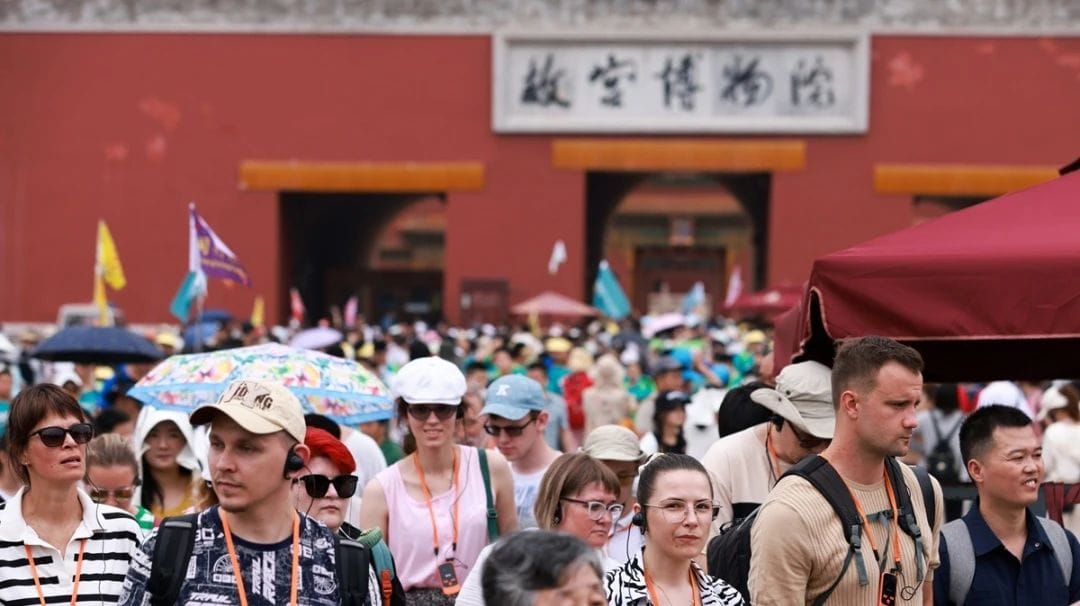
China has extended a warm invitation to international travelers, encouraging them to explore its rich cultural heritage, iconic landmarks like the Great Wall, and natural wonders such as the shimmering West Lake. Additionally, visitors can witness cutting-edge technological advancements and experience the hospitality embodied in China’s winter dining traditions. This announcement was made by Lin Jian, spokesperson for China’s Foreign Ministry, at a press conference on Tuesday, following the release of an updated visa-free transit policy by China’s National Immigration Administration (NIA).
The revised policy, reported by Xinhua News Agency, significantly expands the visa-free transit stay for eligible foreign travelers from 72 and 144 hours to 240 hours—equivalent to 10 days. Effective immediately, the number of ports allowing visa-free entry and exit has increased by 21, bringing the total to 60 across 24 provinces, municipalities, and regions. Moreover, the areas where transit travelers can stay have also been broadened.
Citizens from 54 countries, including the US, Canada, Russia, Brazil, and the UK, qualify for this updated visa-free transit program when traveling to a third country or region. These travelers are now permitted to engage in a variety of activities—such as sightseeing, business, and family visits—within designated areas, provided the stay does not exceed 240 hours. However, activities like employment, studying, or journalism, which require special permits, will still necessitate the appropriate visas beforehand.
The updated policy has generated swift and positive responses from international business communities. Speaking to the Global Times, Soyi Park, assistant manager at the Korea International Trade Association, described the change as “great news,” noting that it will attract more business and leisure visitors to China. “As a key player in global trade, China’s relaxed visa rules will encourage people to prioritize the country for travel and business,” Park added.
Vaughn Barber, Chair of the China-Australia Chamber of Commerce, called the policy “a practical and welcome step” that facilitates short business visits, such as meetings and site inspections, while also offering Australians a chance to experience China firsthand. Quoting the Chinese saying “Bai Wen Bu Ru Yi Jian” (seeing is believing), Barber emphasized the importance of fostering understanding and strengthening ties between the two nations.
Lorenzo Riccardi, Chairman of the China-Italy Chamber of Commerce, echoed similar sentiments, applauding the policy for simplifying short-term travel and enhancing China’s appeal as a travel hub in the Asia-Pacific region. Meanwhile, Oliver Oehms from the German Chamber of Commerce (North China) highlighted how the change aligns with China’s ongoing efforts to make travel easier for businesspeople and tourists.
The announcement has already impacted international travel platforms. According to data from Chinese travel site ly.com, searches for domestic hotels and flights by international tourists surged by 87 percent within an hour of the news. Moreover, hotel bookings for the New Year’s holiday period jumped more than fivefold compared to the previous day.
Yang Jinsong, a researcher at the China Tourism Academy, highlighted that the new policy reflects China’s continued focus on high-level opening-up. He emphasized that it will boost inbound tourism, support regional internationalization, and contribute to overall economic growth.
International media outlets have also taken note of China’s updated policy. CNN reported on China’s clear efforts to increase foreign visitor numbers, remarking on the success of recent policy changes since the country reopened post-pandemic. Reuters acknowledged China’s drive to attract international travelers by waiving visa requirements, while NBC News praised the policy’s convenience for transit passengers, particularly Americans, who would otherwise face cumbersome visa application processes.
Official data further underscores the positive impact of these efforts. Between January and November 2024, China recorded 29.22 million inbound foreign visits, an 86.2 percent increase year-over-year. Notably, 17.45 million of these visits were visa-free, marking a sharp 123.3 percent rise compared to the previous year.
Qunar, a Chinese travel agency, reported a near-tripling of domestic air ticket bookings by international travelers in 2024, with over 10 percent of foreign tourists making repeat visits.
Huo Jianguo, vice chairman of the China Society for World Trade Organization Studies, remarked that the policy reflects China’s commitment to further openness and its willingness to share development opportunities with the world. He added that, regardless of global uncertainties, China’s doors will continue to open wider, offering mutual benefits for travelers and businesses alike.

